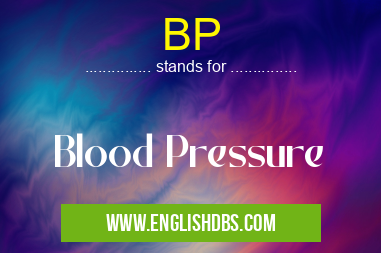What does BP mean in CLINICAL MEDICINE
BP is a commonly used abbreviation in the medical field, representing Blood Pressure. It measures the force exerted by the blood against the walls of blood vessels, indicating the intensity of blood flow throughout the body. Understanding blood pressure is crucial for maintaining overall cardiovascular health and preventing potential health complications.

BP meaning in Clinical Medicine in Medical
BP mostly used in an acronym Clinical Medicine in Category Medical that means Blood Pressure
Shorthand: BP,
Full Form: Blood Pressure
For more information of "Blood Pressure", see the section below.
BP Meaning in MEDICAL
Blood pressure is a vital indicator of the health of the circulatory system. It is typically measured in millimeters of mercury (mmHg) and consists of two values:
- Systolic Blood Pressure (SBP): The pressure when the heart contracts and pumps blood out into the arteries.
- Diastolic Blood Pressure (DBP): The pressure when the heart relaxes and fills with blood.
BP Full Form
The full form of BP is Blood Pressure. It is a key health indicator, providing valuable insights into the functioning of the heart and circulatory system.
What does BP Stand for
BP stands for Blood Pressure in the medical context. It is a critical measurement for assessing an individual's cardiovascular health and potentially detecting underlying conditions that may require medical attention.
Essential Questions and Answers on Blood Pressure in "MEDICAL»CLINICAL"
What is blood pressure?
Blood pressure is the force exerted by blood against the walls of blood vessels. It is measured in millimeters of mercury (mm Hg). The top number (systolic pressure) is the pressure when the heart beats and pumps blood out. The bottom number (diastolic pressure) is the pressure when the heart relaxes and fills with blood.
What is the normal blood pressure range?
Normal blood pressure is considered to be less than 120/80 mm Hg. Blood pressure is considered elevated if it is between 120/80 mm Hg and 129/80 mm Hg. Blood pressure is considered high (hypertension) if it is 130/80 mm Hg or higher.
What are the symptoms of high blood pressure?
High blood pressure often has no symptoms. However, some people may experience headaches, dizziness, shortness of breath, or chest pain.
What causes high blood pressure?
High blood pressure can be caused by a variety of factors, including genetics, diet, exercise, and stress. Some medical conditions, such as kidney disease and diabetes, can also increase blood pressure.
How is high blood pressure treated?
High blood pressure is treated with lifestyle changes, such as losing weight, eating a healthy diet, and exercising regularly. Medications may also be necessary to lower blood pressure.
What are the risks of high blood pressure?
High blood pressure can increase the risk of heart disease, stroke, kidney disease, and other health problems.
How can I prevent high blood pressure?
There are a number of things you can do to prevent high blood pressure, including eating a healthy diet, exercising regularly, and maintaining a healthy weight.
Final Words: BP, meaning Blood Pressure, serves as an essential indicator of cardiovascular health. It is measured to evaluate the force of blood flow against blood vessel walls, providing valuable information for healthcare professionals to make informed decisions regarding diagnosis, treatment, and preventive measures. Regular blood pressure monitoring is recommended for individuals of all ages to maintain optimal cardiovascular health and reduce the risk of developing related complications.
BP also stands for: |
|
| All stands for BP |
